Explore how SARE's farmer-driven research benefits American producers.
Showing 1-20 of 24 results
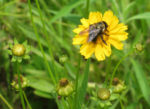
Artificial Nesting Sites Attract Native Pollinators
LAWRENCEVILLE, Georgia – Artificial nesting sites for pollinators placed in apple orchards have shown to boost native bee populations, according to results of a Georgia Gwinnett College study. In a Southern SARE-funded On-Farm Research Grant project, researchers focused on nesting sites for mason bees and mining bees – the workhorses of the native bee world […]
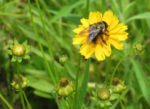
Take Care to Manage Wetlands for Pollinators
FAYETTEVILLE, Arkansas – It’s not uncommon for wetlands, especially those enrolled in federal conservation programs, to be actively managed for plant diversity and wildlife habitat. But University of Arkansas researchers have found an additional reason to maintain these ecosystems, particularly when they occur adjacent to croplands: many pollinators call them home. In a Southern Sustainable […]

NCSU Explores Regionally Adapted Legumes as Forage and Cover Crops
RALEIGH, North Carolina – North Carolina State University researchers are working to expand the portfolio of crops farmers can use in grain, forage and cover crop production. Through a Southern Sustainable Agriculture Research & Education (SSARE) Graduate Student grant, student Rachel Atwell Vann and organic cropping specialist Chris Reberg-Horton field tested 19 winter pea (Pisum […]
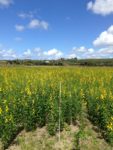
Get the Most Out of Forage Systems for Goats with Sunn Hemp
TUSKEGEE, Alabama – Small ruminant producers in the Southeast can potentially graze their goats year-round on a forage-based production system by incorporating a summer legume, such as sunn hemp, into the traditional bermudagrass pasture. Tuskegee University animal scientist Byeng-ryel Min found that a summer sunn hemp/bermudagrass forage mixture, or sunn hemp alone, followed by winter […]
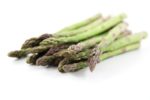
Texas Producer Finds Asparagus Can Be Viable in the South Nearly Year-Round
LYFORD, Texas -- A south Texas producer, interested in increasing the diversity of crop production for local farmers, has found that asparagus can be grown in the Texas heat practically year-round by mimicking the “die-back” that occurs in the plants during dormancy in colder climates. With a Southern Sustainable Agriculture Research & Education (SSARE) Producer […]
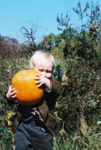
Despite Challenges, the Farm-to-Childcare Relationship Holds Promise
RALEIGH, North Carolina – North Carolina State University researchers are exploring the relationship between farmers and childcare facilities – a segment of the local food movement that holds a myriad of economic and social opportunities. Graduate student Jacob Rutz and local foods Extension specialist J. Dara Bloom, through a $10,636 Southern Sustainable Agriculture Research & […]

Fewer Greenhouse Gases Released When Cattle Graze on Legume-rich Grass Pastures Compared to Nitrogen Fertilized Pastures
GAINESVILLE, Florida – Beef cattle that graze on legume-enriched grass pastures release fewer greenhouse gases compared with the typical nitrogen fertilization regimes in the Southeastern U.S., based on the limited results of a Southern Sustainable Agriculture Research & Education (SSARE)-funded study at University of Florida. The results offer a sustainable grazing management alternative for those […]
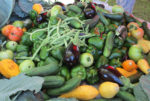
NCSU Researchers Develop Protocol for Measuring Food Waste on the Farm
RALEIGH, North Carolina – A North Carolina State University study quantifying food waste on the farm seems to suggest that the amount of edible and marketable vegetable crops being left in the field after primary harvest is much higher than previously thought. In a Southern Sustainable Agriculture Research & Education (SSARE) Graduate Student Grant, researchers […]
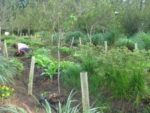
Sun-Baked Virginia Farm Blooms Under a Berm and Swale Permaculture System
KENBRIDGE, Virginia -- It’s 90 degrees, but feels like 105 on the empty white road cutting across Virginia’s flat, coastal plains. There hasn’t been rain in a month and the fields of corn clicking past are curled to grey spikes. The soil between the rows looks like powdered rust. But it’s here, hidden behind pine […]
Hiding in Plain Sight
MCMINVILLE, Tennessee – Winter cover crops, specifically a ryegrass/crimson clover mix, appear to protect susceptible deciduous trees from the flatheaded appletree borer, while also effectively managing weeds, according to results of a Tennessee State University study. The results could be useful for orchards, nurseries, urban landscapes and agroforestry producers in managing the significant economic pest. […]

Bringing Velvet Bean Back as a Grazing Forage
MANOR, Georgia – Motorists passing through rural Manor, GA along Highway 122, perhaps on their way to Waycross, were puzzled by the mystery crop growing on a portion of Lynn Barber’s Heritage Acres farm. “Some of the older farmers knew exactly what it was, but a lot of people were stopping to ask me if […]
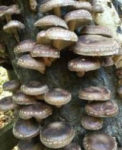
Some Invasive Trees are Good for Mushroom Production
TALLAHASSEE, Florida – Some non-native invasive trees in the Southeast have proven to be ideal substrates for growing edible mushrooms, according to the results of a USDA Agricultural Research Service study funded by a Southern Sustainable Agriculture Research & Education (SSARE) On-Farm Research Grant. USDA-ARS researcher Stephen Hight, in collaboration with small farmers in southern […]
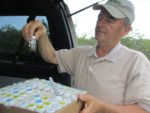
Wildflowers Draw Native Pollinators to Georgia Apple Orchard, Yields Increase
McCAYSVILLE, Georgia – Joe Dickey’s curiosity about bees nearly matches his affinity for birds. “I’ve loved birds ever since I was a kid because of all their different colors,” said Dickey, as he watches yellow finches fly around three 100X100-foot wildflower plots at his farm, Mountain View Orchards. But it’s the bees that are capturing […]
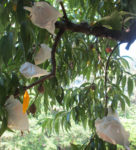
Paper or Pesticides? Bagging Peaches Protects from Insects and Diseases, Increases Yields
SENECA, South Carolina – When Clemson fruit specialist Juan Carlos Melgar suggested putting a paper bag over a peach to detract insects and diseases during production, farmers laughed. But when the trials, funded by a Southern Sustainable Agriculture Research & Education grant, showed that the technique protects the fruit from devastating brown rot, marauding insects […]
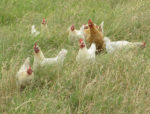
SARE Fellows Tour, a Look at Sustainable Ag Across the Country, Makes a Stop in Texas
D’HANIS, Texas -- Travis Krause lets out a loud cattle call. Within seconds, his herd appears in the distance among the tall grass, brush and trees of the South Texas Plains, and makes a fast trot to where the young farmer is standing. The animals line up side by side as if preparing for a […]

Berries Thrive in High Tunnels, But Be Aware of Pests, According to University of Arkansas Study
FAYETTEVILLE, Arkansas – A University of Arkansas study has found that using high tunnels in berry production can increase yields, extend the harvest season, and improve fruit quality compared to field production. However, care must be taken to manage pests. In the Southern Sustainable Agriculture Research & Education (SSARE)-funded project (LS12-250), “Extending the Market Season […]
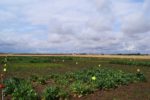
Cover Crops Acting as Trap Crops Protect Vegetables from Pests
LIVE OAK, Florida – For farmers in central Florida, planting cover crops in strips as a trap crop alongside cash crops is proving to be a highly effective method for attracting beneficial insects and controlling pests. Farmers have been so pleased with the results that they have fully adopted the Integrated Pest Management (IPM) strategy […]

A Natural Method of Reducing Post-Harvest Fruit Decay Found
FORT PIERCE, Florida – University of Florida researchers, through a Southern Sustainable Agriculture Research & Education grant, have found a natural method of reducing post-harvest citrus fruit decay. In a SSARE Graduate Student Grant study, researchers found that essential oils, specifically carvacrol and thymol, significantly decrease ‘Ruby Red’ grapefruit natural decay, weight loss and chilling […]

Cover Crops Reduce Pest Numbers and Improve Cash Crop Yields
GAINESVILLE, Florida – Preliminary research from University of Florida has found that incorporating root-knot nematode-resistant cover crops in a perennial peanut rotation reduces pest numbers in the cash crop and improves yields. The results may be helpful for producers who choose top-yielding, yet susceptible, peanut cultivars, as well as resistant cultivars that historically carry a […]
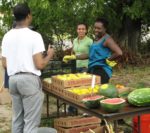
North Carolina Study Shows Local Foods a Driver for Economic Development, Especially in Rural Areas
RALEIGH, North Carolina – North Carolina farms that sell directly to consumers are more interconnected with their local economies than non-direct-to-consumer farms, and have a greater multiplier effect of generated revenue, based on the results of a North Carolina State University survey. The results, which could have applicability on a regional level, are intended to […]